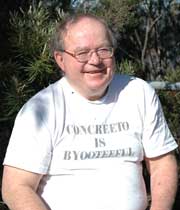Your friends will never forget you
Obituary for Denis Kevans (1939-2005)
Posted Thursday, August 25, 2005
The Australian folk tradition music scene, poetry world and labour movement are all in mourning over the sudden death of the Blue Mountains based poet Denis Kevans at Sydney’s Westmead Hospital on the morning of Tuesday 23rd August 2005 following complications from heart surgery.
Kevans, known for the last 30 years as “The Poet Lorikeet of Australia”, a pun on the title “poet laureate” often bestowed on other writers by the literary establishment, was always regarded as “the people’s poet” because of his close identification with the Aboriginals, Irish political prisoners, other down-trodden, the workers movement, environmental causes, republicanism and the anti-war movement.
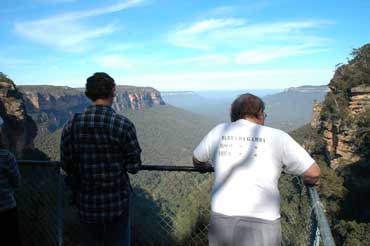
With an Irish Catholic background, where the male side of the family volunteered in both World War One and Two, “war child” Denis Kevans excelled scholastically and in sport. He was in the St Joseph’s College First XV Rugby team in High School, then two years later, as a junior public servant in the old External Affairs Department in Canberra, he was chosen by Sir Robert Menzies for the Prime Minister’s Eleven Cricket Team against the visiting English in the early 1960s.
He wrote many poems on sport, war and politics from a young age with a poem on Gallipoli winning the Mary Gilmore Award for poetry in 1959 and legendary folk singer Gary Shearston recording Denis’s “The Roar of the Crowd” on his seminal vinyl LP “Broadside” as the tumultuous decade of the 1960s drew to a close. Throughout the 1960s Kevans was prominent in both the “Ban The Bomb” anti-nuclear campaign, where his satirical poem “Teen Problems” drew the wrath of The Bulletin magazine, and the anti-war movement, where his “Slouch of Vietnam” poem became the battle hymn of the Vietnam Moratorium Movement.
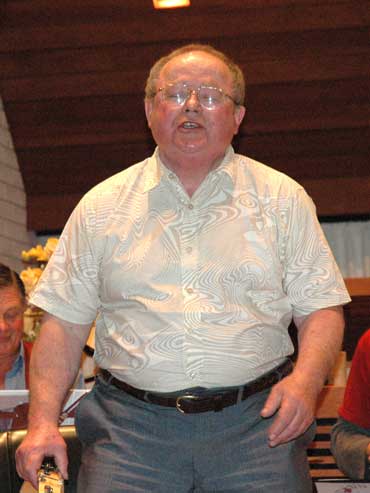
Australia’s inevitable subservience to the USA-led war in Vietnam saw Kevans mimic Canberra’s folly in the Lawson-Paterson tradition of “I had written him a letter” found in “Clancy of the Overflow”. As each American leader arrived on our shores during the war in Vietnam they were greeted with his latest edict: “Welcome Spiro Agnew” was closely followed by “Tell Me Henry (Kissinger) Why I Still Can’t Get To Sleep?”. Both poems were written with all the laconic wit, irony and Australian vernacular of the earlier bards. As was his tribute to the suffering of Australia’s Vietnam Veterans after the war in poems such as “Agent Orange, Agent Blue”.
Denis Kevans, with his younger brother Jacko, who also recently died, were part of the Bush Music and folk song revival period in Australia which began in the mid-1950s with the play “Reedy River” at New Theatre in Sydney. While his brother Jacko stayed with the music tradition his whole life as a performer, Denis excelled at poetry. His involvement with the Realist Writers Group, influenced by Frank Hardy’s “Power Without Glory” and Russell Ward’s “The Australian Legend”, invigorated him to pursue the Henry Lawson tradition for much of his writing career much to the chagrin of the academic and literary establishment who shunned the growing Kevans output in review columns, grant decisions and prestigious anthologies. Denis responded in verse once when establishment poet Les Murray complained about the Literature Board of the Australia Council not renewing one of Murray’s many grants with the poem (They’ll give the grant to) “Anyone But Me”.
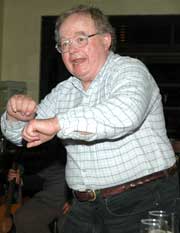
But Denis never worried about the establishment nod. He still had his massive following amongst ordinary Australian workers with endless poems written for and recited on picket lines like “Clowns and Other Clowns” (satirising John Leard during the Comeng dispute in the 1980s), “Cockatoo Island”, “The Dogman”, “Ten Minutes Washing Time”, “The Green Ban Fusiliers” (celebrating Jack Mundey’s BLF and Green Bans movement in the 1970s).
Denis Kevans, a committed environmentalist, was inspired by Jack Mundey and the Green Bans imposed by the Builders Labourers Federation in the 1970s to stop the destruction of Sydney’s heritage and low cost inner-housing stock. He wrote “Across The Western Suburbs We Must Wander”, a parody of the traditional “Across The Western Plains”, to highlight the plight of the evicted working class tenants of Victoria Street, Kings Cross. Many of the older residents of Victoria Street were on war-time tenancies and were illegally moved with their possessions to the outer Western Suburbs of Sydney in the middle of the night by stand-over men. At the Blue Mountains Folk Festival in the late 1990s Jack Mundey launched an album of Denis Kevans’ poems set to music entitled “City of Green - Green Ban Songs and Beyond”.
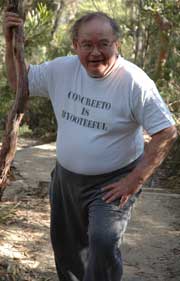
The Denis Kevans legacy to Australian verse and song will be an enduring one. His verse has been recorded by over one hundred local musicians, including Jeannie Lewis and Michael Atherton (from Sirocco), and translated into more than half a dozen languages in overseas anthologies from Vietnam, Russia to South America. His self-published anthologies were partially funded by royalties from Midnight Oil who used an unauthorised version of the Kevans poem “Harrisburg Oh Harrisburg” (on the Three Mile Island nuclear incident in 1979) as the lead-in track on their “Red Sails in the Sunset” 1980s release. Kevans collaborated with many musicians. His most recent efforts were in conjunction with his friend and singing partner Sonia Bennett on her Wollemi Pine CD of environmental songs.
The Kevans contribution to the peace movement in Australia and globally was also significant. He was a tireless campaigner and performer at benefit concerts over many decades. In the last five years he has twice graced the stage of the Sydney Town Hall to recite at East Timor benefit nights - in November 2000 for the Anin Murak Choir tour from Timor and in April 2004 for the Kirsty Sword-Gusmao Alola Foundation benefit. On both occasions he performed “Your Friends Will Never Forget You”, a poem that refers to the Australian Army leaflet dropped over East Timor during World War Two and the betrayal of the the Timorese people by successive Australian Governments. Like many others I can sincerely say in remembering Denis Kevans now “Your Friends will Never Forget You”.
Jefferson Lee is the Special Projects Officer for the Australia-East Timor Association (NSW) and received an MA Honours degree from Uni of NSW in 1987 on completion of his thesis entitled “The Political Content of the Poetic Works of Denis Kevans”, supervised by Donald Horne and co-marked by Denis Altman.Funeral Arrangements:
10.30am, Saturday 3rd September 2005
Leura Memorial Gardens
Lot 1 Kitchener Road, Leura
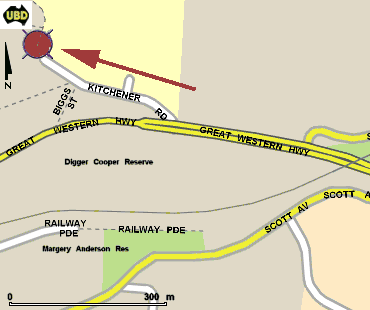
Followed by a wake from 1pm at:
Carrington Hotel
Katoomba Street
Katoomba
Kitchener Road runs north off the Great Western Highway (see map).
Train departs Central: 8.02am (arrives Leura at 9.56am)
Perhaps people driving might be willing to call in at Leura Station to see if there are people needing a lift to the Leura Gardens and onto Katoomba later.
